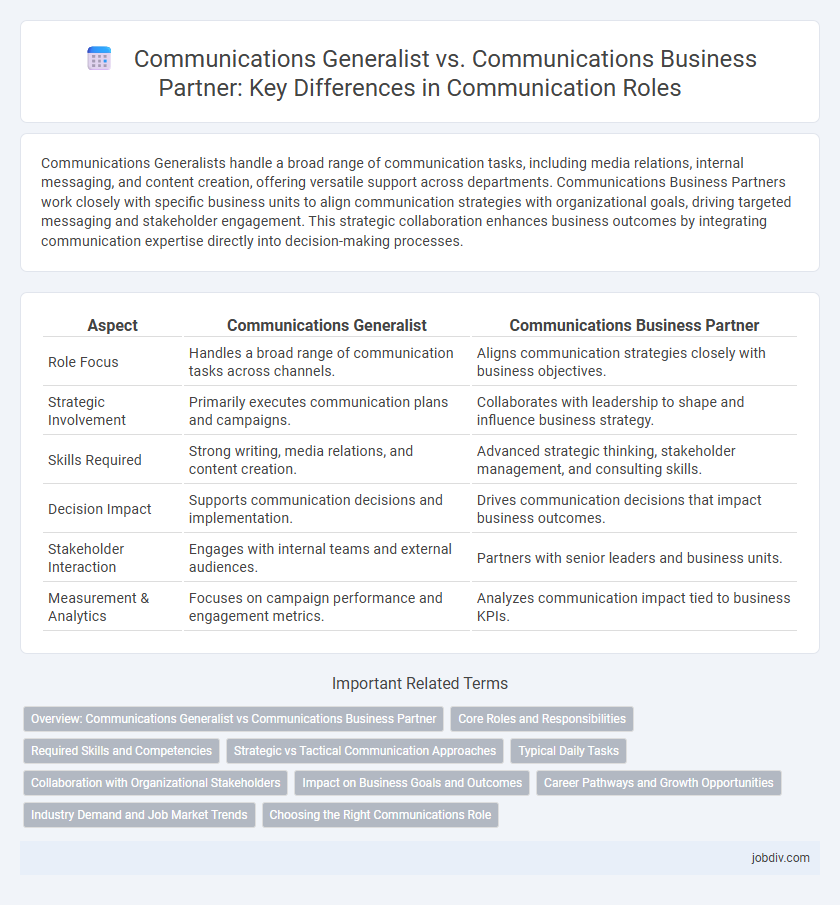Communications Generalists handle a broad range of communication tasks, including media relations, internal messaging, and content creation, offering versatile support across departments. Communications Business Partners work closely with specific business units to align communication strategies with organizational goals, driving targeted messaging and stakeholder engagement. This strategic collaboration enhances business outcomes by integrating communication expertise directly into decision-making processes.
Table of Comparison
| Aspect | Communications Generalist | Communications Business Partner |
|---|---|---|
| Role Focus | Handles a broad range of communication tasks across channels. | Aligns communication strategies closely with business objectives. |
| Strategic Involvement | Primarily executes communication plans and campaigns. | Collaborates with leadership to shape and influence business strategy. |
| Skills Required | Strong writing, media relations, and content creation. | Advanced strategic thinking, stakeholder management, and consulting skills. |
| Decision Impact | Supports communication decisions and implementation. | Drives communication decisions that impact business outcomes. |
| Stakeholder Interaction | Engages with internal teams and external audiences. | Partners with senior leaders and business units. |
| Measurement & Analytics | Focuses on campaign performance and engagement metrics. | Analyzes communication impact tied to business KPIs. |
Overview: Communications Generalist vs Communications Business Partner
A Communications Generalist manages a broad range of communication tasks, including internal messaging, media relations, and content creation, providing versatile support across departments. In contrast, a Communications Business Partner works closely with leadership to align communication strategies with business objectives, driving targeted stakeholder engagement and performance outcomes. Both roles require strong communication skills but differ in strategic involvement and focus on business integration.
Core Roles and Responsibilities
Communications Generalists manage a broad spectrum of communication tasks, including internal messaging, media relations, and content creation, ensuring consistent brand voice across channels. Communications Business Partners collaborate closely with business units to develop strategic communication plans aligned with organizational goals, driving stakeholder engagement and change management initiatives. While Generalists provide versatile support, Business Partners focus on integrating communication strategies with business outcomes to enhance performance and decision-making.
Required Skills and Competencies
A Communications Generalist typically requires strong verbal and written communication skills, proficiency in content creation, social media management, and basic project coordination abilities to support varied communication channels. In contrast, a Communications Business Partner demands advanced strategic thinking, stakeholder management, and change management competencies to align communication initiatives with business objectives. Both roles benefit from analytical skills and adaptability, but the Business Partner role emphasizes influencing organizational culture and driving internal communications strategies.
Strategic vs Tactical Communication Approaches
Communications Generalists typically handle a broad range of tactical communication tasks, such as drafting press releases, managing social media content, and coordinating events, ensuring consistent messaging across various channels. Communications Business Partners engage at a strategic level, aligning communication initiatives with organizational goals, advising leadership on messaging impact, and driving change management through targeted stakeholder engagement. The emphasis on strategic communication enables Business Partners to influence decision-making processes, while Generalists execute communication plans to support those strategies effectively.
Typical Daily Tasks
Communications Generalists typically manage a broad range of tasks including drafting press releases, coordinating social media content, and handling internal company communications to maintain consistent messaging. Communications Business Partners focus on aligning communication strategies with business objectives, collaborating closely with leadership teams to support change management, stakeholder engagement, and executive communications. Both roles require strong writing and interpersonal skills, but Business Partners emphasize strategic planning and cross-departmental collaboration for organizational impact.
Collaboration with Organizational Stakeholders
Communications Generalists manage broad messaging strategies and coordinate communication activities across multiple departments to ensure consistent organizational voice. Communications Business Partners collaborate closely with key organizational stakeholders to tailor communication approaches that support specific business objectives and drive stakeholder engagement. Both roles require strong collaboration skills, but Business Partners focus more on strategic alignment with organizational goals and fostering partnerships at senior management levels.
Impact on Business Goals and Outcomes
Communications Generalists manage a broad range of communication tasks, ensuring consistent messaging and brand alignment that supports overall business goals. Communications Business Partners engage closely with leadership teams to develop strategic communication plans that drive specific business outcomes, such as increased employee engagement and improved customer satisfaction. Their targeted approach directly influences decision-making processes, optimizing organizational performance and goal achievement.
Career Pathways and Growth Opportunities
Communications Generalists typically build broad skill sets across media relations, content creation, and internal communications, offering versatile experience ideal for entry to mid-level roles in diverse industries. Communications Business Partners focus on strategic alignment between communication initiatives and business objectives, often requiring deeper industry knowledge and stakeholder management skills, positioning them for senior roles and leadership opportunities. Career growth for Generalists may lead to specialized or managerial positions, while Business Partners often advance toward executive roles such as Communications Director or Chief Communications Officer.
Industry Demand and Job Market Trends
The Communications Generalist role remains widely sought in industries requiring broad skill sets for managing diverse communication channels and crafting consistent brand messaging, particularly within mid-sized companies and nonprofits. Communications Business Partners are increasingly in demand among large enterprises and multinational corporations due to their strategic involvement in aligning communication plans with business objectives and fostering cross-departmental collaboration. Current job market trends indicate a shift toward specialized communication roles emphasizing strategic impact, with the Communications Business Partner role expected to grow by approximately 15% over the next five years, outpacing more generalist positions.
Choosing the Right Communications Role
Choosing the right communications role depends on organizational needs and individual expertise; a Communications Generalist manages a broad range of tasks such as media relations, internal communication, and content creation, providing versatile support across departments. In contrast, a Communications Business Partner works closely with leadership to align communication strategies with business objectives, ensuring messaging drives organizational performance and stakeholder engagement. Understanding the strategic impact versus operational scope helps professionals select the ideal role for career growth and organizational contribution.
Communications Generalist vs Communications Business Partner Infographic

 jobdiv.com
jobdiv.com